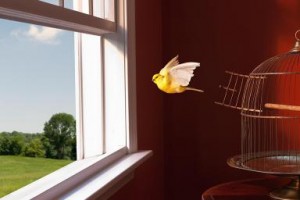“Mala will take care of you, Pohpoh. No one will ever touch you again like that. I will never let anyone put their terrible hands on you again. I, Mala Ramchandin, will set you, Pohpoh Ramchandin, free, free, free, like a bird!” (Pg. 173)
Under the Mudra tree, camouflaged under the untamed brush, sat Mala in a chair with her eyes closed with her mental state churning. Otoh is with his father, and both are trying to enter Mala’s yard, however Mala has yet to be seen by anyone. It is in this passage that Mala coincides her past with the present. Pohpoh, her younger self, exists by her (Mala’s) side. This scene is the unveiling of what Mala has felt about her younger self. Mala was not “fond” of Pohpoh when she and her were one, however as the years went on Mala became more accepting of Pohpoh. It is as though the guilt for not always being able to protect her sister [Asha], the shame of the sexual abuse from her father, and the pain from her mother and Lavina leaving, all exist within Pohpoh. This childhood trauma has seeped out of Pohpoh’s brain into Mala’s, and the chaos in the yard represents the acknowledgment of her past; Mala is brought back into reality and has to confront her torment. I want to make the claim that this acknowledgment of Pohpoh being present with Mala is the eruption of loneliness, anxiety, and misery of her childhood that could never be acknowledged because of the constant physical and mental degradation inflicted by her father. “Mala will take care of you, Pohpoh” is the replacement and loss of their mother and the affirmation that Pohpoh was the mother figure and has grown into being that battered mother figure. It is phrases such as, “no one will ever touch you again like that” that a mother would say to a child. Mala is wishing to travel through time to save the innocence of her younger self, and render her perplexing future so the deterioration of her home, the leaving of her sister, and the incestuous relationship with her father could be abolished. It is to stop the future of Pohpoh’s life as a disoriented being, and to stop her mental deterioration as Mala. “Free, like a bird!” is the final release, the final realization that to move forward, Mala’s needs to reconcile with her past. Thus far in this novel we see that Mala’s home has become devoured and encapsulated with plants, trees and brush, and this build up of nature around is the representation of her past and the “bird” is Mala, waiting to be set free through her own self.

I agree that bringing Pohpoh in Miss Ramchandin’s imaginary world is from her being lonely. I think she is trying to make up for her childhood hardships of not having a mother by being a mother herself. I think she wishes she had a mother or older women figure to look up to in order to get guidance and keep her safe. Her role model (sarah and Lavinia) were taken away from her very young so she is trying to make up for this loss. She is trying to save herself by doing this.
The intuition that Mala’s words to Pohpoh reveals her absence and replacement of mother was the one that I did not catch while I was reading and it expanded my understanding of the scene. Among many questions and issues this book is invoking, it seems like the issue of motherhood also accounts a big portion. A mother as a nurturer in a family is what Pohpoh needed and is keep longing for, but Pohpoh knows and shows that the nurturer is the most vulnerable and the weakest. And the image of leaving, a bird flying for instance, is repeated for nurturers like Pohpoh, Pohpoh’s mother and Otoh’s mother. These all depicts complex sides of motherhood, such as necessity and vulnerability of it and yearning of liberation from and through it.